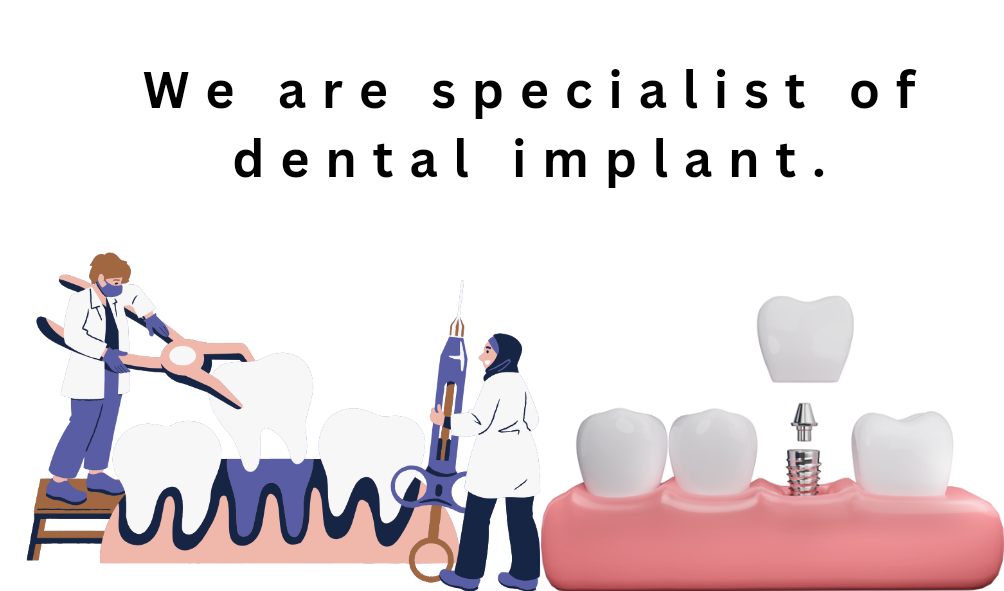Dental Implant

Reviews

Book Your Consultation
What Are Dental Implants?
A dental implant is an artificial tooth root made of titanium or another biocompatible material that is surgically inserted into the jawbone below the gum line. Dental implants provide a strong base for replacement teeth or a dental crown. Dental implants can be a great solution for people who have lost teeth through injury, decay or other dental problems.
Getting dental implants usually involves a few steps. First, your dentist or oral surgeon evaluates your oral health and determines if you are a good candidate for dental implants. This evaluation may include X-ray, CT scan, or other imaging techniques to assess the condition of your jawbone and surrounding tissue.
Once your oral health is evaluated, the next step in the process is to have the implant surgically inserted into your jawbone. The surgeon will make a small incision in your gum tissue to expose your jawbone. Then, they will drill a hole into your jawbone and insert the implant. After the implant is inserted, the gum tissue will be stitched back into the gum tissue and the healing process will begin.
The implant will then attach to the surrounding bone tissue over the next few months in a process known as osseointegrance. This fusion creates a stable and long-lasting base for the replacement tooth.
Once the implant is fully integrated into the jawbone, an abutment is attached to the implant. This serves as a connection between the implant and your new tooth or crown.
A dental crown, bridge or denture is then made to fit onto your abutment and be the same size, shape and color as your natural teeth.
Once your replacement tooth is securely attached to your jawbone, you can start to enjoy the benefits of dental implants, such as improved comfort, stability and longevity. Dental implants can last many years with proper care and maintenance and can provide a permanent solution to missing teeth.
Definition and Concept:
Dental implants, also known as dental implants, are surgical devices used to replace tooth roots. They are metal screw-shaped posts that are inserted into the jawbone and replaced with artificial teeth.
These artificial teeth look and function just like real teeth, and are usually made from titanium, a material that is biocompatible and bonded to the jawbone. These artificial teeth can be used to replace missing teeth, and are often referred to as “crowns,” “bridges,” “dentures” or “dental implants”.
Dental implants have several advantages over traditional dentures and/or bridges. They are more stable, so they don’t slip around the mouth like dentures do, and they don’t damage neighboring teeth like a bridge does. They also help maintain the health of your jawbone, as when you lose a tooth, the jawbone begins to break down. To help prevent this, dental implants stimulate your jawbone..
Components:
1. Implant: titanium post.
A dental implant is an artificial tooth that is inserted into the jawbone to replace a missing tooth. The implant is usually made of titanium, which is a strong, biocompatible material that is fused to the jawbone through a process known as ossointegration.
The crown, or visible part, of a dental implant is made from porcelain or other tooth-colored material. It looks and works just like a real tooth.
Why is titanium the best material for dental implants?
Titanium has several advantages that make it the perfect material for dental implants.
First, titanium is biocompatible. This means that it is well tolerated by the human body. It has a very low chance of rejection.
Second, titanium is strong and durable. It is resistant to the forces of biting or chewing.
Third, titanium is lightweight. It makes dental implants comfortable to wear.
Fourth, titanium is corrosion-resistant, meaning that it won’t rust or break down over time.
2. Abutment: connector between implant and crown.
The abutment is the “middlepiece” that connects the dental implant to the crown. The abutment is typically made of materials such as titanium or zirconia or other metals and is designed to fit the shape and size of your dental implant and your crown.
The abutment plays a key role in the success and longevity of your dental implant restoration. The primary job of an abutment is providing stability and support for your crown while ensuring a good fit and alignment within your mouth.
3. Crown: artificial tooth.
Dental implants are artificial teeth roots made of either titanium or titanium alloy. They are surgically inserted into the jawbone below the gum line to provide a strong base for replacement teeth that will look, feel and function just like natural teeth.
Dental implants can replace one or several missing teeth. They can also support bridges and dentures.
There are several steps to getting a dental implant:
1.Consult with your dentist or oral surgeon. Your oral surgeon will look at your mouth, take x-rays, and talk about your medical history to decide if you are a good candidate for a dental implant.
2.Placement. The dental implant is inserted into your jawbone during a surgical procedure.
3.Healing. It may take a few months for your implant to fully integrate into your jawbone. You may need to wear a temporary restoration during this time.
4.Abutment Placement. Once your implant has fused with your bone, a connector known as an abutment will be attached to your implant. This will serve as the foundation for your artificial tooth or crown.
5. Restoration: Finally, a crown, bridge or denture is fitted onto the abutment to complete the restoration.
Functionality:
1.Mimics natural tooth structure.
Dental implants are a surgical procedure that replaces a missing tooth by surgically inserting a titanium post into your jawbone. This post acts as a stable base for your artificial tooth, which is then attached to it by a titanium crown.
Your artificial tooth is designed to look exactly like your natural teeth. The shape, size and color of your surrounding natural teeth are carefully chosen to create a natural-looking smile that blends in seamlessly with your natural teeth.
Dental implants not only restore the appearance of your smile, but they also allow you to chew and speak normally. This provides patients with a natural-looking, long-lasting solution to missing teeth.
2.Provides stability for chewing and speaking.
Dental implants are one of the most popular and effective ways to replace missing teeth. One key benefit of dental implants is that they provide stability, which is important for activities such as chewing and speaking.
Dental implants, unlike removable dentures, are embedded into the jawbone. This provides a stable base for artificial teeth. Dental implants not only improve comfort, but they also restore natural chewing function and improve speech clarity, allowing patients to feel more confident in their daily activities.
3.Prevents bone loss in the jaw.
Yes, that’s right! Dental implants help prevent bone loss in your jaw. When you lose or remove a tooth, bone in that area starts to break down over time because it’s no longer stimulated. Dental implants are surgically inserted into the jawbone and act as a substitute for a natural tooth. By mimicking the root of a tooth, dental implants stimulate the surrounding bone and help maintain bone density and strength. So, not only do dental implants provide a stable base for replacement teeth, but they also help keep your jawbone healthy and strong
Dental implants








